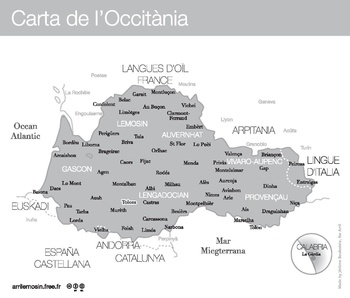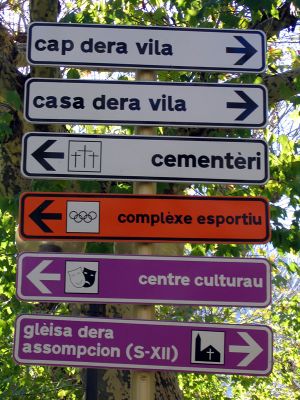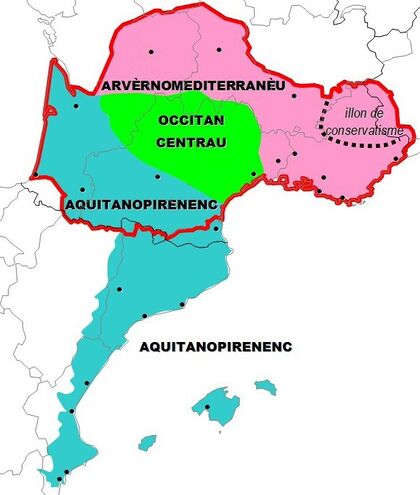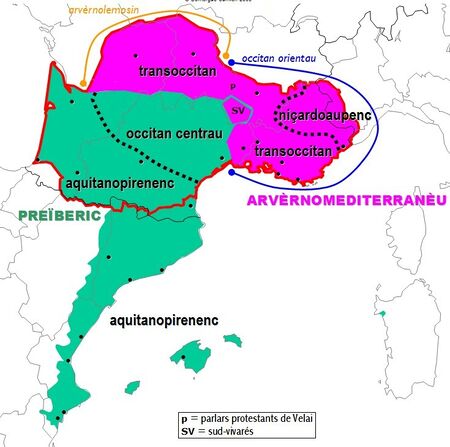اللغة الأوكسيتانية
| Occitan | |
|---|---|
| occitan, lenga d'òc, provençal | |
| موطنها | France, Spain, Italy, Monaco |
| العرق | Occitans |
الناطقون الأصليون | estimates range from 100٬000 to 800٬000 total speakers (2007–2012),[1][2] with 68,000 in Italy (2005 survey),[3] 4,000 in Spain (Val d'Aran)[4] |
الصيغة المبكرة | |
| اللهجات | |
| Latin alphabet (Occitan alphabet) | |
| الوضع الرسمي | |
لغة رسمية في | |
لغة أقلية معترف بها في | |
| ينظمها | Conselh de la Lenga Occitana;[6] Congrès Permanent de la Lenga Occitana;[7] Institut d'Estudis Aranesi[8] |
| أكواد اللغات | |
| ISO 639-2 | oci |
| ISO 639-2 | oci |
| ISO 639-3 | oci – inclusive codeIndividual code: sdt – Judeo-Occitan |
| Glottolog | occi1239 |
| Linguasphere | 51-AAA-g & 51-AAA-f |
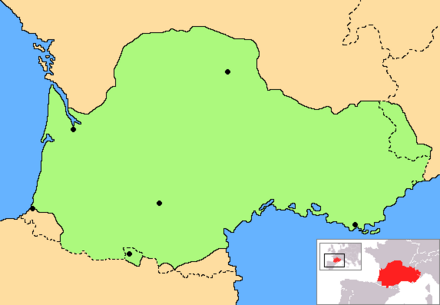 | |
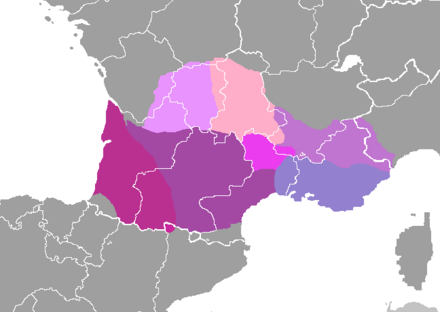 Various dialects of Occitan
| |
Occitan (بالإنگليزيةالنطق: /ˈɒksᵻtən,_ʔtæn,_ʔtɑːn/;[9][10] أوكسيتان: occitan [utsiˈta],[أ] بالفرنسية: [ɔksitɑ̃]), also known as lenga d'òc (أوكسيتانية: [ˈleŋɡɔ ˈðɔ(k)] (![]() استمع); فرنسية: langue d'oc) by its native speakers, is a Romance language (or branch of numerous of these) spoken in Southern France, Monaco, Italy's Occitan Valleys, as well as Spain's Val d'Aran; collectively, these regions are sometimes referred to as Occitania. It is also spoken in the linguistic enclave of Guardia Piemontese (Calabria, Italy). Some include Catalan in Occitan, as the distance between this language and some Occitan dialects (such as the Gascon language) is similar to the distance among different Occitan dialects. Catalan was considered a dialect of Occitan until the end of the 19th century[11] and still today remains its closest relative.[12]
استمع); فرنسية: langue d'oc) by its native speakers, is a Romance language (or branch of numerous of these) spoken in Southern France, Monaco, Italy's Occitan Valleys, as well as Spain's Val d'Aran; collectively, these regions are sometimes referred to as Occitania. It is also spoken in the linguistic enclave of Guardia Piemontese (Calabria, Italy). Some include Catalan in Occitan, as the distance between this language and some Occitan dialects (such as the Gascon language) is similar to the distance among different Occitan dialects. Catalan was considered a dialect of Occitan until the end of the 19th century[11] and still today remains its closest relative.[12]
Occitan is an official language of Catalonia, where a subdialect of Gascon known as Aranese is spoken in the Val d'Aran.[13] Since September 2010, the Parliament of Catalonia has considered Aranese Occitan to be the officially preferred language for use in the Val d'Aran.
Across history, the terms Limousin (Lemosin), Languedocien (Lengadocian), Gascon, and later Provençal (Provençal, Provençau or Prouvençau) have been used as synonyms for the whole of Occitan; nowadays, "Provençal" is understood mainly as the Occitan dialect spoken in Provence, in southeast France.[14]
Unlike other Romance languages such as French or Spanish, there is no single written standard language called "Occitan", and Occitan has no official status in France, home to most of Occitania. Instead, there are competing norms for writing Occitan, some of which attempt to be pan-dialectal, whereas others are based on particular dialects. These efforts are hindered by the rapidly declining use of Occitan as a spoken language in much of southern France, as well as by the significant differences in phonology and vocabulary among different Occitan dialects.
The long-term survival of Occitan is in grave doubt. According to the UNESCO Red Book of Endangered Languages,[15] four of the six major dialects of Occitan (Provençal, Auvergnat, Limousin and Languedocien) are considered severely endangered, whereas the remaining two (Gascon and Vivaro-Alpine) are considered definitely endangered.
. . . . . . . . . . . . . . . . . . . . . . . . . . . . . . . . . . . . . . . . . . . . . . . . . . . . . . . . . . . . . . . . . . . . . . . . . . . . . . . . . . . . . . . . . . . . . . . . . . . . . . . . . . . . . . . . . . . . . . . . . . . . . . . . . . . . . . . . . . . . . . . . . . . . . . . . . . . . . . . . . . . . . . . .
الاسم
تاريخ المصطلح الحديث
التاريخ
الأقطانية هي لغة بجنوب فرنسا وشمال أسبانيا علي ما تبقي من لغة منطقة أقطانيا أو إمارة أقطانية.
التوزع الجغرافي
الاستخدام خارج فرنسا
- In the Val d'Aran, in the northwest corner of Catalonia, Spain, Aranese (a variety of Gascon) is spoken. It is an official language of Catalonia together with Catalan and Spanish.
اللهجات
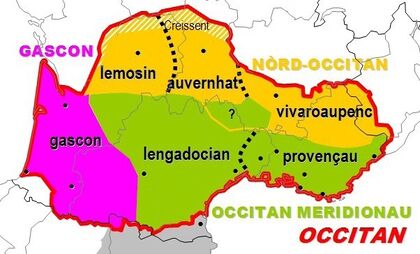
Occitan is fundamentally defined by its dialects, rather than being a unitary language. That point is very conflictual in Southern France, as many people do not recognize Occitan as a real language and think that the next defined "dialects" are languages.[16] Like other languages that fundamentally exist at a spoken, rather than written, level (e.g. the Rhaeto-Romance languages, Franco-Provençal, Astur-Leonese, and Aragonese), every settlement technically has its own dialect, with the whole of Occitania forming a classic dialect continuum that changes gradually along any path from one side to the other. Nonetheless, specialists commonly divide Occitan into six main dialects:
- Gascon: includes the Béarnese and Aranese (spoken in Spain).
- Languedocien (lengadocian)
- Limousin (lemosin)
- Auvergnat (auvernhat)
- Provençal (provençau or prouvençau), including the Niçard subdialect.
- Vivaro-Alpine (vivaroaupenc), also known as "Alpine" or "Alpine Provençal", and sometimes considered a subdialect of Provençal
The northern and easternmost dialects have more morphological and phonetic features in common with the Gallo-Italic and Oïl languages (e.g. nasal vowels; loss of final consonants; initial cha/ja- instead of ca/ga-; uvular ⟨r⟩; the front-rounded sound /ø/ instead of a diphthong, /w/ instead of /l/ before a consonant), whereas the southernmost dialects have more features in common with the Ibero-Romance languages (e.g. betacism; voiced fricatives between vowels in place of voiced stops; -ch- in place of -it-), and Gascon has a number of unusual features not seen in other dialects (e.g. /h/ in place of /f/; loss of /n/ between vowels; intervocalic -r- and final -t/ch in place of medieval -ll-). There are also significant lexical differences, where some dialects have words cognate with French, and others have Catalan and Spanish cognates. Nonetheless, there is a significant amount of mutual intelligibility.
| English | Cognate of French | Cognate of Catalan and Spanish | |||
|---|---|---|---|---|---|
| Occitan | French | Occitan | Catalan | Spanish | |
| house | maison | maison | casa | casa | casa |
| head | testa | tête | cap | cap | cabeza |
| to buy | achaptar | acheter | crompar | comprar | comprar |
| to hear | entendre | entendre | ausir / [audir] Error: {{Lang}}: unrecognized variant: gascon (help) | oir | oír |
| to be quiet | se taire | taire | calar | callar | callarse |
| to fall | tombar | tomber | caire | caure | caer |
| more | pus | plus | mai | més | mas |
| always | totjorn | toujours | sempre | sempre | siempre |
Gascon is the most divergent, and descriptions of the main features of Occitan often consider Gascon separately. Max Wheeler notes that "probably only its copresence within the French cultural sphere has kept [Gascon] from being regarded as a separate language", and compares it to Franco-Provençal, which is considered a separate language from Occitan but is "probably not more divergent from Occitan overall than Gascon is".[17]
There is no general agreement about larger groupings of these dialects.
Max Wheeler divides the dialects into two groups:[17]
- Southwestern (Gascon and Languedocien), more conservative
- Northeastern (Limousin, Auvergnat, Provençal and Vivaro-Alpine), more innovative
Pierre Bec divides the dialects into three groups:[18]
- Gascon, standing alone
- Southern Occitan (Languedocien and Provençal)
- Northern Occitan (Limousin, Auvergnat, Vivaro-Alpine)
Bec also notes that some linguists prefer a "supradialectal" classification that groups Occitan with Catalan as a part of a wider Occitano-Romanic group. One such classification posits three groups:
- "Arverno-Mediterranean" (arvèrnomediterranèu), same as Wheeler's northeastern group, i.e. Limousin, Auvergnat, Provençal and Vivaro-Alpine
- "Central Occitan" (occitan centrau), Languedocien, excepting the Southern Languedocien subdialect
- "Aquitano-Pyrenean" (aquitanopirenenc), Southern Languedocien, Gascon and Catalan
According to this view, Catalan is an ausbau language that became independent from Occitan during the 13th century, but originates from the Aquitano-Pyrenean group.
Domergue Sumien proposes a slightly different supradialectal grouping.[19]
- Arverno-Mediterranean (arvèrnomediterranèu), same as in Bec and Wheeler, divided further:
- Niçard-Alpine (niçardoaupenc), Vivaro-Alpine along with the Niçard subdialect of Provençal
- Trans-Occitan (transoccitan), the remainder of Provençal along with Limousin and Auvergnat
- Pre-Iberian (preïberic)
- Central Occitan (occitan centrau), same as in Bec
- Aquitano-Pyrenean (aquitanopirenenc), same as in Bec
. . . . . . . . . . . . . . . . . . . . . . . . . . . . . . . . . . . . . . . . . . . . . . . . . . . . . . . . . . . . . . . . . . . . . . . . . . . . . . . . . . . . . . . . . . . . . . . . . . . . . . . . . . . . . . . . . . . . . . . . . . . . . . . . . . . . . . . . . . . . . . . . . . . . . . . . . . . . . . . . . . . . . . . .
Codification
Writing system
| Classical norm | Mistralian norm | Bonnaudian norm | Escòla dau Pò norm |
|---|---|---|---|
| Provençal Totei lei personas naisson liuras e egalas en dignitat e en drech. Son dotadas de rason e de consciéncia e li cau (/fau/) agir entre elei amb un esperit de frairesa. |
Provençal Tóuti li persouno naisson liéuro e egalo en dignita e en dre. Soun [ك] doutado de rasoun e de counsciènci e li fau agi entre éli em' un esperit de freiresso. |
||
| Niçard Provençal Toti li personas naisson liuri e egali en dignitat e en drech. Son dotadi de rason e de consciéncia e li cau agir entre eli emb un esperit de frairesa. |
Niçard Provençal Touti li persouna naisson liéuri e egali en dignità e en drech. Soun [ك] doutadi de rasoun e de counsciència e li cau agì entre eli em' un esperit de frairessa. |
||
| Auvergnat Totas las personas naisson liuras e egalas en dignitat e en dreit. Son dotadas de rason e de consciéncia e lor chau (/fau/) agir entre elas amb un esperit de frairesa. |
Auvergnat Ta la proussouna neisson lieura moé parira pà dïnessà mai dret. Son charjada de razou moé de cousiensà mai lhu fau arjî entremeî lha bei n'eime de freiressà. (Touta la persouna naisson lieura e egala en dïnetàt e en dreit. Soun [ك] doutada de razou e de cousiensà e lour chau ajî entre ela am en esprî de freiressà.) |
||
| Vivaro-Alpine Totas las personas naisson liuras e egalas en dignitat e en drech. Son dotaas de rason e de consciéncia e lor chal agir entre elas amb un esperit de fraternitat. |
Vivaro-Alpine Toutes les persounes naisoun liures e egales en dignità e en drech. Soun [ك] douta de razoun e de counsiensio e lour chal agir entre eels amb (/bou) un esperit de freireso. | ||
| Gascon Totas las personas que naishen liuras e egaus en dignitat e en dreit. Que son dotadas de rason e de consciéncia e que'us cau agir enter eras dab un esperit de hrairessa. |
Gascon (Febusian writing) Toutes las persounes que nachen libres e egaus en dinnitat e en dreyt. Que soun [ك] doutades de rasoû e de counscienci e qu'ous cau ayi entre eres dap û esperit de hrayresse. |
||
| Limousin Totas las personas naisson liuras e egalas en dignitat e en drech. Son dotadas de rason e de consciéncia e lor chau (/fau/) agir entre elas emb un esperit de frairesa. |
|||
| Languedocien Totas las personas naisson liuras e egalas en dignitat e en drech. Son dotadas de rason e de consciéncia e lor cal agir entre elas amb un esperit de frairesa. |
| French Tous les êtres humains naissent libres et égaux en dignité et en droits. Ils sont doués de raison et de conscience et doivent agir les uns envers les autres dans un esprit de fraternité.[20] |
Franco-Provençal Tôs los étres homans nêssont libros et ègals en dignitât et en drêts. Ils ant rêson et conscience et dêvont fâre los uns envèrs los ôtros dedens un èsprit de fraternitât.[20] |
Catalan Totes les persones neixen/naixen lliures i iguals en dignitat i en drets. Són dotades de raó i de consciència, i han de comportar-se fraternalment les unes amb les altres.[20] |
Spanish Todos los seres humanos nacen libres e iguales en dignidad y derechos y, dotados como están de razón y conciencia, deben comportarse fraternalmente los unos con los otros.[20] |
Portuguese Todos os seres humanos nascem livres e iguais em dignidade e direitos. Eles são dotados de razão e consciência, e devem comportar-se fraternalmente uns com os outros.[20] |
Italian Tutti gli esseri umani nascono liberi ed uguali in dignità e in diritti. Sono dotati di ragione e di coscienza e devono comportarsi fraternamente l'uno con l'altro.[20] |
English All human beings are born free and equal in dignity and rights. They are endowed with reason and conscience and should act towards one another in a spirit of brotherhood.[21] |
Note that Catalan version was translated from the Spanish, while the Occitan versions were translated from the French. The second part of the Catalan version may also be rendered as "Són dotades de raó i de consciència, i els cal actuar entre si amb un esperit de fraternitat", showing the similarities between Occitan and Catalan.
See also
- Baìo
- History of the Basque language
- Languages of France
- Languages of Italy
- Languages of Spain
- Occitan cross
- Occitan cuisine
Notes
- ^ Bernissan, Fabrice (2012). "Combien l'occitan compte de locuteurs en 2012?". Revue de Linguistique Romane (in الفرنسية). 76: 467–512.
- ^ Martel, Philippe (December 2007). "Qui parle occitan ?". Langues et cité (in الفرنسية). No. 10. Observation des pratiques linguistiques. p. 3.
De fait, le nombre des locuteurs de l'occitan a pu être estimé par l'INED dans un premier temps à 526 000 personnes, puis à 789 000 ("In fact, the number of occitan speakers was estimated by the French Demographics Institute at 526,000 people, then 789,000")
- ^ Enrico Allasino; Consuelo Ferrier; Sergio Scamuzzi; Tullio Telmon (2005). "Le Lingue del Piemonte" (PDF). IRES. 113: 71 – via Gioventura Piemontèisa.
- ^ (in ca)Enquesta d'usos lingüístics de la població 2008, Statistical Institute of Catalonia, 2009, https://llengua.gencat.cat/permalink/ef6f907d-5381-11e4-8f3f-000c29cdf219
- ^ Norme in materia di tutela delle minoranze linguistiche storiche, Italian parliament, http://www.parlamento.it/parlam/leggi/99482l.htm
- ^ CLO's statements in Lingüistica Occitana (online review of Occitan linguistics).Lingüistica Occitana: Preconizacions del Conselh de la Lenga Occitana, 2007, http://linguistica-oc.com/wp-content/uploads/2013/07/Linguistica-occitana-6-CLO.pdf
- ^ "Page d'accueil". Région Nouvelle-Aquitaine – Aquitaine Limousin Poitou-Charentes.
- ^ "Reconeishença der Institut d'Estudis Aranesi coma academia e autoritat lingüistica der occitan, aranés en Aran" [Recognition of the Institute of Aranese Studies as an academy and linguistic authority of Occitan, Aranese in Aran]. Conselh Generau d'Aran (in Aranese). 2 April 2014.
{{cite web}}: CS1 maint: unrecognized language (link) - ^ قالب:OED
- ^ Oxford Advanced Learner's Dictionary (7th ed.). 2005.
{{cite encyclopedia}}: Missing or empty|title=(help) - ^ Friend, Julius W. (2012). Stateless Nations: Western European Regional Nationalisms and the Old Nations. Palgrave Macmillan. p. 80. ISBN 978-0-230-36179-9. Retrieved 5 March 2016.
- ^ Smith & Bergin 1984, p. 9
- ^ As stated in its Statute of Autonomy approved. See Article 6.5 in the Parlament-cat.net Archived 26 أغسطس 2013 at the Wayback Machine, text of the 2006 Statute of Catalonia (PDF)
- ^ Dalby, Andrew (1998). "Occitan". Dictionary of Languages (1st ed.). Bloomsbury Publishing plc. p. 468. ISBN 0-7475-3117-X. Retrieved 8 November 2006.
- ^ "UNESCO Atlas of the World's Languages in danger". www.unesco.org.
- ^ "Alliance des langues d'Oc". Institut Béarnais & Gascon. Archived from the original on 9 November 2013. Retrieved 6 March 2014.
- ^ أ ب Wheeler, Max (1988), "Occitan", in Harris, Martin; Vincent, Nigel, The Romance Languages, New York: Oxford University Press, pp. 246–278
- ^ Bec 1973.
- ^ Domergue Sumien (2006), La standardisation pluricentrique de l'occitan: nouvel enjeu sociolinguistique, développement du lexique et de la morphologie, Publications de l'Association Internationale d'Études Occitanes, Turnhout: Brepols
- ^ أ ب ت ث ج ح "Universal Declaration of Human Rights (Article 1)". Omniglot.com. Retrieved 15 October 2009.
- ^ "Universal Declaration of Human Rights (Article 1)". Omniglot.com. Retrieved 15 October 2009.
Explanatory footnotes
- ^ Regional pronunciations: [u(t)siˈtɔ], [ukʃiˈtɔ], [uksiˈta].
Bibliography
- Anglade, Joseph (1921). Grammaire de l'ancien provençal ou ancienne langue d'oc: phonétique et morphologie (in الفرنسية). Paris: C. Klincksieck.
- Backer, Louis de (1860). Grammaire comparée des langues de la France, par Louis de Baecker. Flamand, allemand, celto-breton, basque, provençal, espagnol, italien, français, comparés au sanscrit (in الفرنسية). Paris: C. Blériot.
- Bec, Pierre (1963). La Langue occitane. Que sais-je? 1059 (in الفرنسية). Paris: Presses Universitaires de France.
- Bec, Pierre (1973). Manuel pratique d'occitan moderne (in الفرنسية). Paris: A. & J. Picard.
- Carrera, Aitor (2007). Gramatica Aranesa (in الأوكسيتانية). Lleida: Pagès Editors. ISBN 978-84-9779-484-8.
- Gaussen, Yvan (1927). Du fédéralisme de Proudhon au Félibrige de Mistral (in الفرنسية). Nîmes: A. Chastanier.
- Kremnitz, Georg (2002). "Une approche sociolinguistique". In Kirsch, Fritz Peter; Kremnitz, Georg; Schlieben-Lange, Brigitte (eds.). Petite histoire sociale de la langue occitane: Usages, images, littérature, grammaires et dictionnaires (in الفرنسية). Chabrant, Catherine trans. Canet, France: Trabucaire. ISBN 978-2-912966-59-9.
- Smith, Nathaniel B.; Bergin, Thomas Goddard (1984). An Old Provençal Primer. New York: Garland. ISBN 0-8240-9030-6.
. . . . . . . . . . . . . . . . . . . . . . . . . . . . . . . . . . . . . . . . . . . . . . . . . . . . . . . . . . . . . . . . . . . . . . . . . . . . . . . . . . . . . . . . . . . . . . . . . . . . . . . . . . . . . . . . . . . . . . . . . . . . . . . . . . . . . . . . . . . . . . . . . . . . . . . . . . . . . . . . . . . . . . . .
External links
قالب:Interwiki قالب:OldWikisource
- Orbilat.com – Overview and grammar of Occitan
- Occitanet.free.fr – a guide to the language
- Globegate.UTM.edu – Troubadour & Early Occitan Literature
- Ostaldoccitania.net – The house of Occitan associations of Toulouse
- Eonet.ne – "LexRomEdic", electronic version of Lexique Roman of Rainouard (A provisional version is available).
- arrilemosin.fr – Occitan Limousin group website with maps and vocabulary
- Bastir Occitanie – Apprendre l'occitan : ÊTRE / AVOIR au présent de l'indicatif [+ English, español] – To be, to have in Occitan language
- CS1 الفرنسية-language sources (fr)
- CS1 errors: missing title
- Short description is different from Wikidata
- Language articles with speaker number undated
- Languages which need ISO 639-3 comment
- Languages with ISO 639-2 code
- Languages with ISO 639-1 code
- Language articles without reference field
- Language articles with unsupported infobox fields
- Articles containing أوكسيتان (بعد 1500)-language text
- Articles containing فرنسية-language text
- Articles containing قطلان-language text
- Articles containing إسپانية-language text
- Lang and lang-xx template errors
- Articles with hatnote templates targeting a nonexistent page
- CS1 الأوكسيتانية-language sources (oc)
- Languages of Andorra
- Languages of France
- Languages of Italy
- Languages of Piedmont
- Languages of Catalonia

